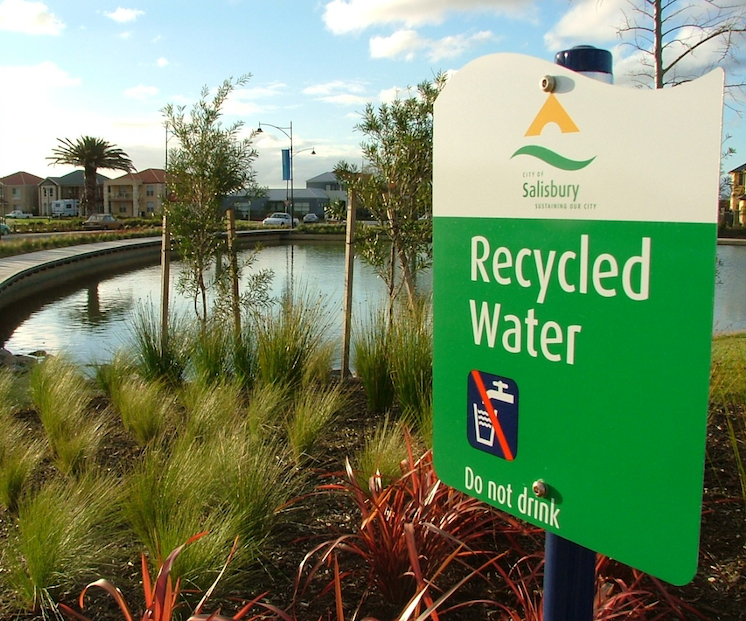Alternative water supplies
Fit-for-purpose alternative water supplies have several benefits. First, it conserves drinking water resources for uses that require water to be highly treated, supporting water security during drought. Second, alternative water supplies often remove potential pollutants from the natural environment. In conventional water management models, both stormwater and wastewater carry significant amounts of nutrients and other pollutants into natural water systems, causing ecological degradation, poor amenity and disruptions to recreational uses. Alternative water supplies can also help avoid augmentations of conventional infrastructure and increase self-sufficiency for communities.

Central Park Recycled Water Scheme
New South Wales
This is the world’s biggest recycled water facility in the basement of a residential building, which collects wastewater along with stormwater runoff and rainwater to supply non-potable water demands in the precinct.
Warrnambool Roof Water Harvesting Project
Victoria
This landmark scheme collects water directly from rooftops across a new development and transfers it to a local raw water reservoir where it is treated and utilised as part of the town's potable water supply.
Kalamunda MAR
Western Australia
The Hartfield Park Managed Aquifer Recharge project in the Shire of Kalumunda involves the recharge of an aquifer under controlled conditions in order to store water for
later abstraction for irrigation use.
Kalkallo Stormwater Harvesting and Reuse
Victoria
The Kalkallo Stormwater Harvesting and Reuse Scheme is the first facility in Australia attempting to harvest and treat stormwater to a standard acceptable for direct injection into the drinking water system.
Currumbin Ecovillage Rainwater Harvesting
Queensland
The Currumbin Ecovillage is a 147 lot development in the Gold Coast Hinterland with sustainability at its heart. It demonstrates off-grid living and includes large rainwater tanks on each lot to provide drinking water.
Currumbin Ecovillage Wastewater Management
Queensland
The Currumbin Ecovillage is a 147 lot development in the Gold Coast Hinterland with sustainability at its heart. Wastewater is treated on-site and provided back to the houses for non-potable uses.
Orange
New South Wales
First of its kind in Australia, City of Orange implemented a stormwater harvesting scheme to supplement their town potable water supply.
South Bank Parklands Rain Bank
Queensland
A public parklands in the heart of Brisbane has implemented an alternative water supply scheme for irrigation and toilet flushing by utilising harvested stormwater and filtered backwash from pools and water features.
Salisbury Alternative Water Scheme
South Australia
Non-drinking water in the City of Salisbury is called ‘Salisbury Water’. This mix of treated stormwater and native groundwater is used to irrigate parks, reserves and schools. It is also used in industry and for toilet/garden use in some new residential developments. Collection, storage and distribution of the water uses constructed wetlands, Managed Aquifer Recharge (MAR) and over 150km of ‘purple pipe’ distribution network across the City.
Angus Creek Stormwater Harvesting and Reuse Scheme
New South Wales
The Angus Creek stormwater harvesting and reuse scheme (the scheme) extracts flows from Angus Creek and harvests stormwater runoff from hard surfaces to irrigate the the Blacktown International Sportspark and neighbouring reserves, supplying up to 200ML of fit-for-purpose water each year.
Collaborative planning for the Fishermans Bend Urban Redevelopment
Victoria
This scale and profile presented a unique opportunity in building water sensitive cities, as the economies of scale help to support novel infrastructure approaches and ‘best in class’ approaches to water servicing and urban development.
Glenelg to Adelaide Pipeline (GAP)
South Australia
The Glenelg to Adelaide pipeline delivers a reliable climate independent water supply to irrigate open space in western and central Adelaide.
Marrickville West Primary School eco water garden
New South Wales
This project involved diverting water from a council drain into the grounds of Marrickville West Primary School, filtering it and then harvesting it to create a green space for the school and the local community.